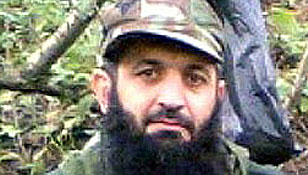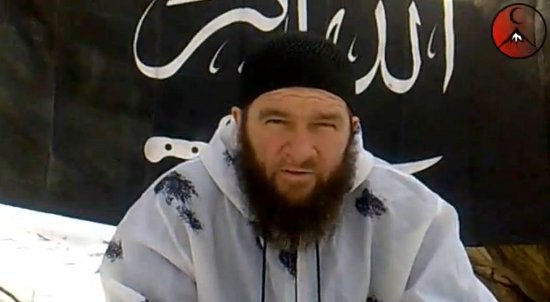|
|
|
Aslambek Vadalov, the new leader of the Islamic Caucasus Emirate. |
Doku Umarov, the emir of the al Qaeda-linked Islamic Caucasus Emirate in southern Russia, has “stepped down” as the group’s leader and vowed to continue to wage “personal jihad.”
Umarov announced his resignation as emir on a Youtube video posted at Kavkaz Center, the propaganda arm of the Caucasus Emirate. The video has since been removed from the Internet and Kavkaz Center‘s website is currently offline.
“We have unanimously decided that I shall leave my post today,” Umarov said, according to a partial translation of the video provided by Al Jazeera English.
Umarov vowed to continue to fight the Russians, just not as leader of the Islamic Caucasus Emirate.
“This [stepping down] does not mean that I give up jihad,” he said. “I will do whatever I can by word and deed.”
Umarov handed over the top leadership position of the Islamic Caucasus Emirate to Aslambek Vadalov. Umarov had named Vadalov as his successor on July 25 and asked that all members of the Caucasus Emirate swear bayat, or allegiance, to Vadalov [see Threat Matrix report, Doku Umarov names his successor].
“Emir of the Caucasus Emirate urged Mujahideen to accept his choice and emphasized that in case of his death, commanders of the Mujahideen and governors of provinces of the Caucasus Emirate should pledge bayat (oath) to Emir Aslambek and obey him as long as long as Emir Aslambek obeys Sharia of Allah and adheres to Sunnah of Prophet Muhammad (pbuh),” a statement posted on Kavkaz Center on July 24 stated.
Vadalov served as the “commander of the Eastern Front of the Armed Forces of the Caucasus Emirate,” a region that includes the Russian republics of Dagestan and Chechnya, prior to his promotion by Umarov. Dagestan and Chechnya are two of the most violent regions in the Caucasus.
The timing of Umarov’s resignation from command is interesting, as it takes place just a little over a month after he was placed by the US on the list of specially designated global terrorists. Over the past four years, Umarov has reignited the terror insurgency in the Caucasus and has backed suicide attacks throughout the region and even inside Russia. On a videotape released on the Internet, Umarov claimed credit for the March 29 double suicide attack on the Moscow Metro that killed 39 people, and vowed to conduct further strikes in Russia.
|
|
|
Doku Umarov, the leader of the Islamic Caucasus Emirate, al Qaeda’s affiliate in the Caucasus, from a videotape in which he took credit for the March 29 suicide attacks on the Moscow Metro. |
Background on Russia’s battle against al Qaeda and allied groups in the Caucasus
Over the past two decades, al Qaeda has fought alongside Chechen rebels during two brutal wars against the Russians that are thought to have resulted in the deaths of more than 100,000 civilians and thousands of Russian soldiers and Chechen fighters. The bulk of the Chechen resistance was smashed after the Second Chechen War, but al Qaeda and allied Islamist groups continued to operate, and managed to radicalize many of the remaining nationalist rebels.
Russian security forces, backed by local forces in the Caucasus, have had success in decapitating the top leadership of al Qaeda and radical Chechen forces. After killing Ibn al Khattab in 2002, security forces eliminated his successors; Abu Walid al Ghamdi was killed in 2004, and Abu Hafs al Urdani was killed in 2006.
Russian security forces also killed Saif al Islam al Masri, a member of al Qaeda’s shura and a chief financier, in 2002; and Muhammad bin Abdullah bin Saif al Tamimi (also known as Abu Omar Saif) in 2005. Tamimi served as second in command to Shamil Basayev, the military commander for the Islamic Army in the Caucasus. In 2006, Basayev and much of his leadership cadre were killed by Russian security forces.
After Basayev’s death in 2006, the Chechen and Caucasus jihadists united under the command of Doku Umarov, one of the last remaining original leaders of the Chechen rebellion and a close associate of al Qaeda. Prior to 2006, Umarov had denied having connections with al Qaeda and rejected terrorist attacks against civilians. But in 2006, Abu Hafs al Urduni announced that the Chechen jihad was being reorganized under the command of Doku Umarov after the death Basayev. By November 2007, Umarov had declared an Islamic emirate in the greater Caucasus region and named himself the emir, or leader. Russian security forces thought Umarov was killed during a raid in November 2009 that killed several of his close aides, but he has since resurfaced.
But the insurgency in the Caucasus largely went dormant after Basayev’s death in 2006. In the spring of 2009, Umarov reignited the insurgency by launching a wave of suicide attacks in the Caucasus. In April 2009, Umarov revived the Riyad-us-Saliheen martyr brigade, which has spearheaded the assault.
“Riyad [the Riyad-us-Saliheen martyr brigade] is believed to be descended from two other Chechen terrorist organizations led by Basayev, the Special Purpose Islamic Regiment (SPIR) and the International Islamic Brigade (IIB),” according to the Study of Terrorism and Responses to Terrorism database. “It has even been suggested that Riyad is simply the result of the marriage of these two groups.”
The Caucasus Emirate’s most recent high-profile suicide operations include: the double suicide attack in Moscow’s Metro on March 29 (39 people killed); a double suicide attack that targeted police in the city of Kizlyar in Dagestan on March 31 (13 people killed); and a suicide attack at a concert in Starvopol on May 26 (seven killed).
Russia’s Federal Security Service has targeted the Caucasus Emirate’s top leaders during raids this year. Four top commanders have been killed or captured since February, including two foreign leaders.
On Feb. 2, the FSB killed Mokhmad Mohamad Shabban during a raid in a mountainous region in Dagestan. Shabban, an Egyptian who is better known as Saif Islam or the Sword of Islam, was one of the founders of al Qaeda in the Caucasus.
On March 2, FSB commandos killed Said Buryatsky and five other terrorists during a raid in Ingushetia. Buryatsky was the mufti, or religious leader, for the Caucasus Emirate, and has been described as Russia’s Osama bin Laden.
On June 9, the FSB captured Emir Magas, the military commander of the Caucasus Emirate. Magas was a longtime associate of Basayev and Ibn al Khattab. One day later Russian forces killed Yasir Amarat, a wanted terrorist commander from Jordan.










1 Comment
Is the “retiring for personal reasons” excuse being offered because he has to have *some* visibility in order to be a terrorist leader, and he realizes if he has *any* visibility he is dead meat?